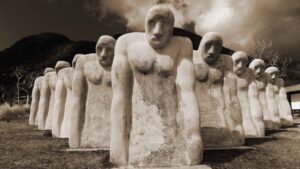Nadim Siraj
New Delhi, May 22, 2021: Long before terms such as ‘climate change’ and ‘eco-activism’ had come into fashion, Sunderlal Bahuguna had become the pioneer of environmental movement in India.
From the famous Chipko movement, to forcing Indira Gandhi to ban deforestation, protesting against the contentious Tehri dam project for decades, to taking on the dangerous liquor mafia in the Himalayas – Bahuguna scripted a journey that went on to inspire environmentalists from all over the world.
His demise on Friday at the age of 94 is like the end of an era that will be most remembered for his grit and passion for saving the jungles of the Himalayas from the clutches of corporate as well as state imperialism.
BAHUGUNA VS. FORD
While it is Chipko of the 1970s that is most synonymous with his name, one of his lesser known battles to save nature had come during the 2000s against Alfred Brush Ford, a great-grandson of American automobile tycoon Henry Ford, the founder of the Ford Motor Company.
Also Read: A War That Can Be Seen From Satellites
The story goes like this.
In 2005, Alfred Ford, a top Detroit-based investor, had signed an MoU with the Himachal Pradesh state government to build a massive international ski resort around Manali.
The investment for the mega tourism project came directly from ABF, the company owned by Alfred Ford.
As per the project plans, the ski resort would house 700 five-star rooms, 300 chalets, a handicraft village, a ropeway service, and a food court, among other delights, that would attract holidaying crowds from India and abroad.
However, well aware of the possible negative impact that such expansive projects in the lap of nature could have, Bahuguna had swung into action, joining a torrent of activists with a mission to coax the authorities to scrap the deal.
Bahuguna not only feared that Alfred Ford’s tourism and entertainment project around Manali would destabilise the ecological balance of the surrounding environment, he also felt the MoU itself was not drawn up in the best interests of the locals.
Along with many other environmentalists, he had argued that the agreement handed Ford’s company blanket rights to Manali’s forests for a 99-year period – a condition that he felt was objectionable.
Also Read: Protesting Farmers Shoot Letter To PM, Ask Him To Come To Negotiating Table At Once
Denudation of the forests, displacement of dozens of villagers, disturbance of the sources of water were also among various issues that he and other activists highlighted at that time.
In fact, it had even been reported at that time that Bahuguna and fellow protesters were contemplating conveying their worries straight to the American government.
The resistance of the locals against Alfred Ford’s project was led mainly by three entities – Jan Jangran evam Vikas Samiti, Jan Hit Sangarsh Samiti, and Him Niti Abhiyan.
A comprehensive fact-finding report on the likely impact of the proposed ski project, published at that time, gives a vivid lowdown of Alfred Ford’s mission.
The preliminary report, titled ‘Impacts of the proposed Himalayan Ski-Village Project in Kullu, Himachal Pradesh’, was written by Manshi Asher. It shed light on the likely impact of Alfred Ford’s plan, focusing on the implications on forest cover, livelihoods of the locals, the company’s obligations, cultural concerns, and several other areas.
Years down the line, Henry Ford’s great-grandson’s ski resort dreams in Himachal remained in limbo, with the state’s political elite choosing to walk a tightrope on the project instead of ramming it ahead.
FORD’S MAYAPUR CONNECTION
Alfred Ford, however, remains deeply tied to India though. He is a self-proclaimed devotee of the Hindu god Krishna and has invested in ISKCON set-up in Mayapur, in Bengal’s Nadia district.
Bahuguna’s fight to save Manali from the proposed ski resort is one of countless battles he’s fought – although it’s relatively less discussed that his epic struggles to universalise the Chipko movement.
His philosophy was simple, powerful and timeless. To depend on nature, you have to protect nature – be it the trees, be it the rivers, or be it the mountains.
Bahuguna has left us, but his famous words will remain with us forever – ‘Ecology is permanent economy’. With him gone, it is an uneasy thought to think if there indeed are enough warriors like him next in line to protect India’s precious hills.
An Indian man’s account from war-hit Israel. Listen to the horrifying story:








